How we came to this: modern smartphones and their prospects
I would like to share with you my view on the history of smartphones and their OS. The idea to write about it is inspired by the hype around Windows Phone 7/8, a bunch of opposing reviews, reviews, etc. This article will be interesting first of all for young people, as they probably don’t remember how smartphones have evolved these 15 years since their appearance.
Now the smartphone market is dominated by three OS: Android, iOS and the dying Symbian. Potentially, there is every chance of entering the "big league" of another OS - Windows Phone. Now the presence of a multitouch touch screen is the norm, holivars such as Android vs iOS (like sometime Windows vs Linux) are being conducted on the network. A bunch of sracha on the fact that "Microsoft was late, all is lost", etc., etc. And on this occasion I want to share my point of view. But first, an excursion into history ...
I also remember the days when any phone was called a smartphone, on which you could even put some program, Java games were considered the height of coolness, and the camera was only for super-expensive models, while the quality of the pictures was such that we would they did not believe that it was possible.
The pioneer of the smartphone movement was Nokia. They created one of the first real PDA + Phone in one Nokia 9000 case

Here is such a device back in 1996 was the height of technical thought. It used an adapted OS. In subsequent products, the famous and now dying has already appeared (someone may disagree with me, but more on that later) Symbian (2001). It was the first full and widespread mobile OS. By this time, there have already been several attempts by other companies to create their mobile OS and products based on them, but all of them were not successful.
')
Already later, in 2003, Windows Mobile appeared (slowed down and buggy, which was never fixed). Previous versions of Windows CE are not widely available.
But the first version of Symbian.


By the way, once my friend had such a phone. At that far time it was something unreal.
I myself eventually acquired the Siemens SX1 , and I was just incredibly pleased with it (many considered buttons on the side to be extremely stupid). Unfortunately, this phone is not very reliable.
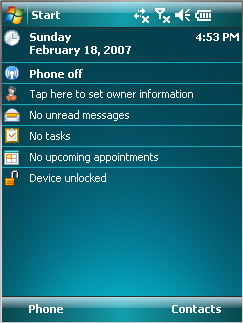
Windows Mobile 6. At the time, essentially the only common touchscreen OS. The problem of touch devices then was a resistive screen. Because of the constant pressure on him with the stylus, the insides “were squeezed out” over time. So my first E-TEN Glofiish M700 communicator died:

Unlike then my old man, Siemens, he terribly braked. But still, both devices were simply megacut. That's the way Symbian and Windows Mobile walked along side by side. After the "raccoon" I managed to try another great device - Nokia E51:

And I will tell you, for all the time using the phones, this one suited me the most. There was no touchscreen on it, but it was comfortable, lightweight, with a nice metal case, and although he had to change the speaker, I had to give this phone how sorry it was to part. It was a time when Nokia really did cool things. Somewhere far away, there were still RIM Blackberry smartphones, but few people knew about them, and indeed it was thought that they were devices for businessmen, so this wave did not pass us. To be honest, in all my life I have never seen such a device live. And at this very moment in the bowels of Google / Android Inc. Android was intensively developed, which was not even planned at that time by touch.
A distinctive feature of this time was that, in fact, nothing fundamentally new appeared in the world of mobile phones. Everything was just a development of the old, massive smartphones became very gradual. And then the presentation of the iPhone thundered. The phone was immediately dubbed a toy, but it had two main distinguishing features: it was beautiful and elegant in everything - from exterior design to beautiful scrolling gestures and icons. And worked without brakes and glitches.
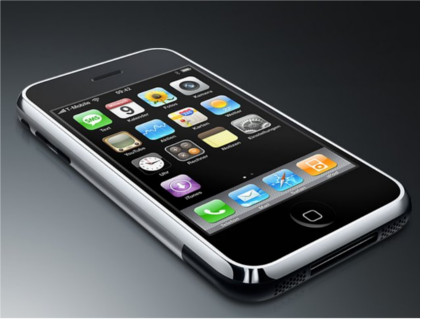
He did not have multitasking, many opportunities were missing, but the world quickly appreciated the simplicity and convenience with which it was possible to use this device. And then ... And then the App Store appeared. For the first time it became so easy to install applications on the phone. (Almost simultaneously, the Windows Mobile Marketplace appeared , but due to the lack of any promotion, very few people knew about it. I myself only found out recently ... when it was closed.)
At this point something important happened. The moment came when the world began the transition to a new generation of devices. It was not new in terms of stuffing (except for capacitive screens + multi-touch), and not in terms of features, but in terms of convenience and ease of operation. In fact, even the iPhone's visual interface was not a revolution.

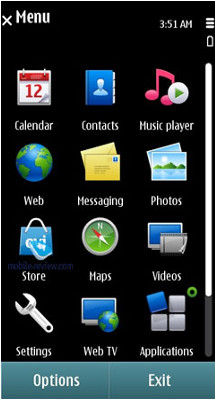
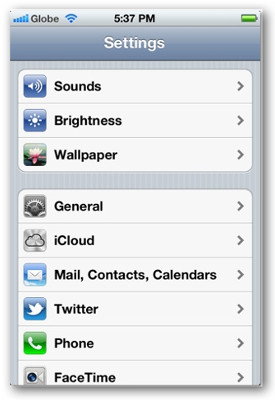
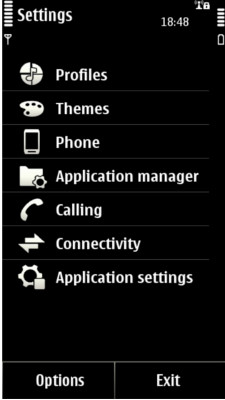
It was beautifully drawn, but conceptually no different. The same grid of icons, the same menu. The novelty was in touch control, in gestures. The world quickly realized that it is much more convenient and reliable, and with time and cheaper buttons.
At this moment, in fact, other manufacturers of smartphones / OS found themselves in a situation when it was necessary to change something. In Google, with the Android that was not yet released, they immediately realized that without a similar interface, this very robot would die without appearing, and started rewriting the interface. What is remarkable, in principle, it did not require rewriting the entire OS, but only a small part of it. Nokia just released a new touch version of Symbian, which almost did not differ from the usual one ... and that was its main mistake. The era of push-button smartphones was coming to an end, Apple opened a new era of gesture control, but Nokia was apparently not aware of it then. RIM has remained aloof in its small niche, and Microsoft, apparently, immediately realized that Windows Mobile was time to die. Unfortunately, unlike Symbian, which could be adapted to new trends, Windows Mobile required a completely new interface, which meant complete incompatibility with old applications. And this is not to mention the speed of work. The problem with Microsoft was that there was no replacement.
The current position of Windows Phone suggests that Microsoft immediately began working on a new OS. The fact that Windows Phone 7 is built on the Windows CE kernel, and now the transition to NT is coming in version 8, speaks of the rush with which Microsoft was required to release something new. And now we come to the key moment that has shaped the modern market. At that time, in fact, there were 4 players in the market:
- Apple iOS / iPhone
- Nokia Symbian
- Microsoft Windows Mobile
- RIM Blackberry
And preparing to blow up the world of Android.
Apple has firmly established its niche and set a new standard in the industry.
Symbian at that time had every chance to retain its market share and prospects, if Nokia realized where the wind of change is blowing and began to move in the right direction ... which, unfortunately, it did not. This decision was the main mistake of Nokia, and exactly from that moment the Symbian era began to decline. She kept afloat only due to inertia.
RIM did not respond quickly enough ... and lost the market.
Microsoft remained in a vacuum. Windows Mobile has suddenly become untenable, and Windows Phone was able to appear only at the end of 2010 ... and lost time.
Google responded instantly ... And after half a year, the first version of Android came out. Yes, it was terribly buggy and little functional, but it had something that all the major market players missed. She followed the example set by Apple ... and won. While the iPhone became the de facto standard for Hi-End smartphones, Android gradually took up all the other niches, right down to the budget devices. Windows Phone did not become so successful, not because it was not good enough, but because the market was already fully occupied. Two years was enough for the market to split into the dominant iOS and Android, and the dying of all other systems. Creating another similar OS made no sense. Therefore, MeeGo and other projects failed, not because they were not sufficiently developed, only small communities remained from them. There was nothing there for which it was worth switching to them, while on iOS and Android there were hundreds of thousands of applications, often the same ones.
Android has become a kind of iOS clone on the one hand, and the opposite on the other. The essence of the confrontation of these two systems is freedom against reliability.
What awaits us ahead? It seems to me that only Windows Phone now has a real chance to become the third, if not a giant of the industry, then at least a major player. Why? To the credit of Microsoft, they were able to offer the market what others could not offer - a new, truly new and fresh interface, and maximum unification with the desktop version of its system, where Microsoft occupies about 90% of the market ... well, a lot more money to make it all to promote. It will not force out Android and iOS, but thanks to these two factors, it will be able to survive and take its place in the sun.

I especially want to mention the new Metro-Modern interface. Since the advent of Symbian, this is the first real innovation in the visualization of the interface. And it brings us two new things at once: a completely new look and a new functionality - combining the application shortcut with the widget. Convenient and beautiful - such that you want to use. The tendency of phones to follow functionality towards desktops will only help Microsoft in this matter.
Hardly Windows Phone will take a large share of iOS - as Apple fans are fans, but it will deal a blow to the share of Android - the price category of devices on these operating systems (Win & Android) intersects in a very large range. Why inflict? Android has its own problems, which are already boring to many (including me - speaking as a user of both a phone and a tablet based on this OS) - freedom turned against the OS itself, there is a lot of rubbish in the market (even Google realized this and is trying to do something), the rebranding of the Android Market in Google Play has changed almost nothing, I'm not talking about DalvikVM. Until I started developing I did not realize how slow and slow it was. Plus interface brakes and other nonsense that annoy me as a user.
It seems to me that now we are witnessing a historical moment when the final mobile OS market is being formed, one that was formed from a PC in the 90s, when, in fact, Windows, Linux and MacOS X remained, and all the rest did not die. then stayed in the backyard. The same players will now share the market, only instead of Linux there will be its mobile Android clone. How to share the market, it is difficult to predict, but the fact that there is no room left for others is a fact. And that's why.
I will not list the number of projects that have remained projects. I think in the comments you will call a dozen more cool operating systems, but let's face it - at the moment they do not affect the market. None of the major players are interested in promoting something else. And users do not really want to try the unknown. Windows Phone has taken the last free space, and if this system does not crash (and I’m sure that it will not), as evidenced by the increase in the number of applications in the Windows Store, no one else can squeeze. By the way, it is also noteworthy that for developers of these applications, the system attracts despite the presence of two huge other markets - iOS, Android, investments in which will clearly pay off more quickly. So the developers believe in it. And that means users will get something for which it is worth buying it.
IOS, mature and reliable in its essence, is the old-new Windows Phone, which will surely survive the period of formation and a certain glitchiness, but still gain a foothold in the market, and open-source Android, free from all sides, will always find its buyer and will not die thanks to fans of free software (if, of course, Google does not follow the path of tightening control over the system, which is quite possible in the current situation) - I think we see a historical moment of the consolidation of three ecosystems on the mobile OS market. All the others either switch to them or lose, and only the BlackBerry will probably keep a small niche for itself, but will never regain its former glory and greatness ...
PS I beg you not to take the post as a complete statement, this is only the personal opinion of the author. Also, do not take the post as praise / srach in the direction of open source or proprietary software. If you do not agree with me - just write in the comments.
Now the smartphone market is dominated by three OS: Android, iOS and the dying Symbian. Potentially, there is every chance of entering the "big league" of another OS - Windows Phone. Now the presence of a multitouch touch screen is the norm, holivars such as Android vs iOS (like sometime Windows vs Linux) are being conducted on the network. A bunch of sracha on the fact that "Microsoft was late, all is lost", etc., etc. And on this occasion I want to share my point of view. But first, an excursion into history ...
I also remember the days when any phone was called a smartphone, on which you could even put some program, Java games were considered the height of coolness, and the camera was only for super-expensive models, while the quality of the pictures was such that we would they did not believe that it was possible.
The pioneer of the smartphone movement was Nokia. They created one of the first real PDA + Phone in one Nokia 9000 case

Here is such a device back in 1996 was the height of technical thought. It used an adapted OS. In subsequent products, the famous and now dying has already appeared (someone may disagree with me, but more on that later) Symbian (2001). It was the first full and widespread mobile OS. By this time, there have already been several attempts by other companies to create their mobile OS and products based on them, but all of them were not successful.
')
Already later, in 2003, Windows Mobile appeared (slowed down and buggy, which was never fixed). Previous versions of Windows CE are not widely available.
But the first version of Symbian.


By the way, once my friend had such a phone. At that far time it was something unreal.
I myself eventually acquired the Siemens SX1 , and I was just incredibly pleased with it (many considered buttons on the side to be extremely stupid). Unfortunately, this phone is not very reliable.

Windows Mobile 6. At the time, essentially the only common touchscreen OS. The problem of touch devices then was a resistive screen. Because of the constant pressure on him with the stylus, the insides “were squeezed out” over time. So my first E-TEN Glofiish M700 communicator died:

Unlike then my old man, Siemens, he terribly braked. But still, both devices were simply megacut. That's the way Symbian and Windows Mobile walked along side by side. After the "raccoon" I managed to try another great device - Nokia E51:

And I will tell you, for all the time using the phones, this one suited me the most. There was no touchscreen on it, but it was comfortable, lightweight, with a nice metal case, and although he had to change the speaker, I had to give this phone how sorry it was to part. It was a time when Nokia really did cool things. Somewhere far away, there were still RIM Blackberry smartphones, but few people knew about them, and indeed it was thought that they were devices for businessmen, so this wave did not pass us. To be honest, in all my life I have never seen such a device live. And at this very moment in the bowels of Google / Android Inc. Android was intensively developed, which was not even planned at that time by touch.
A distinctive feature of this time was that, in fact, nothing fundamentally new appeared in the world of mobile phones. Everything was just a development of the old, massive smartphones became very gradual. And then the presentation of the iPhone thundered. The phone was immediately dubbed a toy, but it had two main distinguishing features: it was beautiful and elegant in everything - from exterior design to beautiful scrolling gestures and icons. And worked without brakes and glitches.

He did not have multitasking, many opportunities were missing, but the world quickly appreciated the simplicity and convenience with which it was possible to use this device. And then ... And then the App Store appeared. For the first time it became so easy to install applications on the phone. (Almost simultaneously, the Windows Mobile Marketplace appeared , but due to the lack of any promotion, very few people knew about it. I myself only found out recently ... when it was closed.)
At this point something important happened. The moment came when the world began the transition to a new generation of devices. It was not new in terms of stuffing (except for capacitive screens + multi-touch), and not in terms of features, but in terms of convenience and ease of operation. In fact, even the iPhone's visual interface was not a revolution.




It was beautifully drawn, but conceptually no different. The same grid of icons, the same menu. The novelty was in touch control, in gestures. The world quickly realized that it is much more convenient and reliable, and with time and cheaper buttons.
At this moment, in fact, other manufacturers of smartphones / OS found themselves in a situation when it was necessary to change something. In Google, with the Android that was not yet released, they immediately realized that without a similar interface, this very robot would die without appearing, and started rewriting the interface. What is remarkable, in principle, it did not require rewriting the entire OS, but only a small part of it. Nokia just released a new touch version of Symbian, which almost did not differ from the usual one ... and that was its main mistake. The era of push-button smartphones was coming to an end, Apple opened a new era of gesture control, but Nokia was apparently not aware of it then. RIM has remained aloof in its small niche, and Microsoft, apparently, immediately realized that Windows Mobile was time to die. Unfortunately, unlike Symbian, which could be adapted to new trends, Windows Mobile required a completely new interface, which meant complete incompatibility with old applications. And this is not to mention the speed of work. The problem with Microsoft was that there was no replacement.
The current position of Windows Phone suggests that Microsoft immediately began working on a new OS. The fact that Windows Phone 7 is built on the Windows CE kernel, and now the transition to NT is coming in version 8, speaks of the rush with which Microsoft was required to release something new. And now we come to the key moment that has shaped the modern market. At that time, in fact, there were 4 players in the market:
- Apple iOS / iPhone
- Nokia Symbian
- Microsoft Windows Mobile
- RIM Blackberry
And preparing to blow up the world of Android.
Apple has firmly established its niche and set a new standard in the industry.
Symbian at that time had every chance to retain its market share and prospects, if Nokia realized where the wind of change is blowing and began to move in the right direction ... which, unfortunately, it did not. This decision was the main mistake of Nokia, and exactly from that moment the Symbian era began to decline. She kept afloat only due to inertia.
RIM did not respond quickly enough ... and lost the market.
Microsoft remained in a vacuum. Windows Mobile has suddenly become untenable, and Windows Phone was able to appear only at the end of 2010 ... and lost time.
Google responded instantly ... And after half a year, the first version of Android came out. Yes, it was terribly buggy and little functional, but it had something that all the major market players missed. She followed the example set by Apple ... and won. While the iPhone became the de facto standard for Hi-End smartphones, Android gradually took up all the other niches, right down to the budget devices. Windows Phone did not become so successful, not because it was not good enough, but because the market was already fully occupied. Two years was enough for the market to split into the dominant iOS and Android, and the dying of all other systems. Creating another similar OS made no sense. Therefore, MeeGo and other projects failed, not because they were not sufficiently developed, only small communities remained from them. There was nothing there for which it was worth switching to them, while on iOS and Android there were hundreds of thousands of applications, often the same ones.
Android has become a kind of iOS clone on the one hand, and the opposite on the other. The essence of the confrontation of these two systems is freedom against reliability.
What awaits us ahead? It seems to me that only Windows Phone now has a real chance to become the third, if not a giant of the industry, then at least a major player. Why? To the credit of Microsoft, they were able to offer the market what others could not offer - a new, truly new and fresh interface, and maximum unification with the desktop version of its system, where Microsoft occupies about 90% of the market ... well, a lot more money to make it all to promote. It will not force out Android and iOS, but thanks to these two factors, it will be able to survive and take its place in the sun.

I especially want to mention the new Metro-Modern interface. Since the advent of Symbian, this is the first real innovation in the visualization of the interface. And it brings us two new things at once: a completely new look and a new functionality - combining the application shortcut with the widget. Convenient and beautiful - such that you want to use. The tendency of phones to follow functionality towards desktops will only help Microsoft in this matter.
Hardly Windows Phone will take a large share of iOS - as Apple fans are fans, but it will deal a blow to the share of Android - the price category of devices on these operating systems (Win & Android) intersects in a very large range. Why inflict? Android has its own problems, which are already boring to many (including me - speaking as a user of both a phone and a tablet based on this OS) - freedom turned against the OS itself, there is a lot of rubbish in the market (even Google realized this and is trying to do something), the rebranding of the Android Market in Google Play has changed almost nothing, I'm not talking about DalvikVM. Until I started developing I did not realize how slow and slow it was. Plus interface brakes and other nonsense that annoy me as a user.
It seems to me that now we are witnessing a historical moment when the final mobile OS market is being formed, one that was formed from a PC in the 90s, when, in fact, Windows, Linux and MacOS X remained, and all the rest did not die. then stayed in the backyard. The same players will now share the market, only instead of Linux there will be its mobile Android clone. How to share the market, it is difficult to predict, but the fact that there is no room left for others is a fact. And that's why.
I will not list the number of projects that have remained projects. I think in the comments you will call a dozen more cool operating systems, but let's face it - at the moment they do not affect the market. None of the major players are interested in promoting something else. And users do not really want to try the unknown. Windows Phone has taken the last free space, and if this system does not crash (and I’m sure that it will not), as evidenced by the increase in the number of applications in the Windows Store, no one else can squeeze. By the way, it is also noteworthy that for developers of these applications, the system attracts despite the presence of two huge other markets - iOS, Android, investments in which will clearly pay off more quickly. So the developers believe in it. And that means users will get something for which it is worth buying it.
IOS, mature and reliable in its essence, is the old-new Windows Phone, which will surely survive the period of formation and a certain glitchiness, but still gain a foothold in the market, and open-source Android, free from all sides, will always find its buyer and will not die thanks to fans of free software (if, of course, Google does not follow the path of tightening control over the system, which is quite possible in the current situation) - I think we see a historical moment of the consolidation of three ecosystems on the mobile OS market. All the others either switch to them or lose, and only the BlackBerry will probably keep a small niche for itself, but will never regain its former glory and greatness ...
PS I beg you not to take the post as a complete statement, this is only the personal opinion of the author. Also, do not take the post as praise / srach in the direction of open source or proprietary software. If you do not agree with me - just write in the comments.
Source: https://habr.com/ru/post/151987/
All Articles